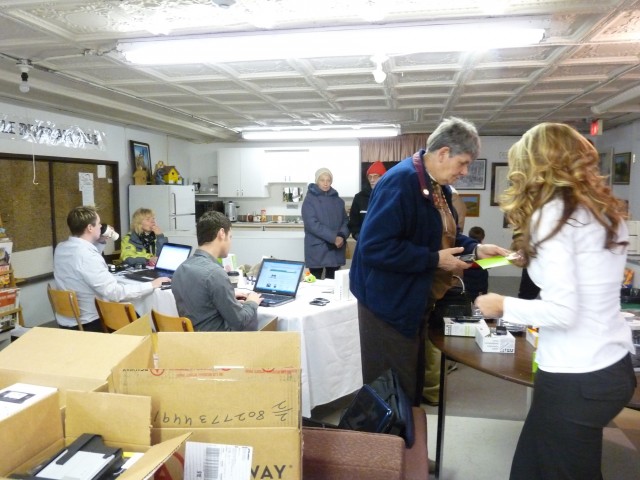High speed internet coming to a cell tower near you
The Boundary Economic Development Committee (BEDC) provided Greenwood with the opportunity to explore fresh, new technology last week when Telus set up a demonstration of their new internet key. In a rural area that has been waiting for years to see high speed internet services delivered to the more remote areas, this new solution bypasses the need to develop expensive fibre optic infrastructure – anywhere there is a cell phone signal, people can use the internet. Both Bell and Telus are offering this new technology that links computers to the internet via the cell phone systems already in place.
No, this isn’t an advertisement for Telus, but the BEDC felt the region needed to address the lack of broadband coverage. Instead of searching for funding to bring in the wired technology, the directors are interested in connecting residents with the technologies available to serve them.
“I think it’s a plus – its technology that’s just coming out. The regional district has gone as paperless as much as possible, the boardroom upgrade in Grand Forks is with the top technology for video conferencing, and that’s the future. We identified broadband as one of the priorities for the BEDC so we’re following through providing the information to the public about what’s out there,” said Marguerite Rotvold, chair of the Regional District of Kootenay Boundary (RDKB).
This is the first time that Telus has done an on-site demonstration. Steve Jenkins, general manager for Telus for the southern interior has been looking for innovative ways to try and get the capacity out to the communities.
“Greenwood’s been an area that in the past has been challenged in terms of high speed internet access. Telus upgraded our wireless capability last November so it now provides consumers in the Greenwood, Rock Creek and Midway area a really solid alternative to high speed internet. We’ve brought the devices to Greenwood so people can see what exactly is involved with the technology, they can try it and see what kind of speeds they can get,” explained Jenkins. “From a technology perspective it’s really new and it’s very exciting.”
The presentation in Greenwood was done in partnership with Telus store representatives Andres Audiotronics from Kelowna and Castlegar. The new technology represents an investment of $1.2 billion by Telus in Alberta and B.C. to upgrade the networks, said Jenkins. Operating at speeds faster than the standard asymmetric digital subscriber line (ADSL) or cable connections, the new internet stick costs about the same as a good modem, but is portable meaning you can plug into the net anywhere you are in the cell system. As an extra bonus there are ways to substitute subscriber information module (SIM) cards into the stick for international travel allowing users to access the internet without roaming or long distance costs.
“The internet sticks plug into a universal serial bus (USB) port on your computer. Instead of having a traditional modem, the internet stick is actually your modem. Instead of working off your phone line, it works off the cellular network,” said Jenkins. “You’re looking at well over $100 thousand to bring high speed internet to a place like Greenwood. When you do the return on investment on plans over the number of subscribers it doesn’t make sense to bring high speed internet to Greenwood. With this wireless capability, it’s a viable alternative.”
Download speeds are up to 21.1 megabytes per second (Mbps) and uploads can do 5.76 Mbps topping the average ADSL connection. A typical ADSL connection provides download speeds of 3 to 6 Mbps as a comparison.
“For a lot of the communities in rural or isolated areas where they have smaller populations, or the populations are spread out, its difficult to justify the investment in infrastructure that is required to do a lot of the technologies,” said Christopher Stevenson, city councillor for Greenwood and a director at the RDKB. “This is the first time they (Telus) have brought their technologies to us, in the smaller communities. Hopefully, we can do it again in Grand Forks or Midway instead of people here having to travel to Castlegar or Kelowna to get the information.”
Rotvold believes that the event was successful in bringing information to people in the community, and in addressing some of the pressing issues that the rural communities are facing.
“It’s a win all around. Economic development and residents connecting, that’s what it’s all about,” said Rotvold. “This event also gives Telus the opportunity to see what some of the issues are. We did raise some of the issues like the location of cell towers, and lack of coverage.”
Stevenson agreed that the information shared at the demonstration and other meetings that the BEDC held with Telus have been beneficial.
“It’s a really good opportunity for people in the communities to let the people who are able to make changes, like Mr. Jenkins, know what their concerns are,” said Stevenson.






















